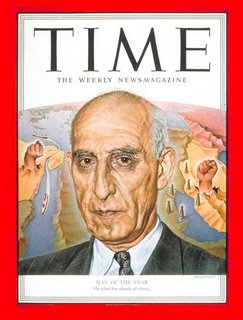
Dit is Mohammed Mossadeq die door Time in 1951 tot 'Man van het Jaar' werd gekozen vanwege 'his moral integrity and courage to stand up to the British and despite all the odds continue his campaign for nationalizing Iranian Oil. However, Time is amazed that Mossaddegh had not been dealt with by the British and the US.' Maar Iran werd niet voor lang met rust gelaten. 19 augustus 1953 werd de democratisch gekozen Iraanse premier tijdens een CIA-coup afgezet omdat hij de Iraanse olie had genationaliseerd. Tot dan toe was de olie in handen van het Westen geweest. Zie: http://web.mit.edu/taalebi/www/soscof/oilNationalization/ Dit wetende is het interessant te lezen wat de Amerikaanse auteur Tom Engelhardt en de Amerikaanse hoogleraar Michael T. Klare al op 12 april vorig jaar schreven: 'Oil, Geopolitics, and the Coming War with Iran. While our media is filled with stories on the Bush administration and Iran, they almost invariably focus on the Iranian nuclear program (or European negotiations and U.S. non-negotiations about the same). You could read our press for weeks at a time – if you didn't stray onto the business pages – and not be aware that Iran sits on a sea of oil and natural gas. In fact, I don't think it's an exaggeration to say that, for long stretches, a typical newspaper reader or prime-time TV news viewer, or, for that matter, an NPR listener, would have just about no way of knowing that our world runs on oil. Of course, our local gas stations are informative enough on the subject these days, so this reality is lost on few people. Still, the sort of piece that hit the front page of the British Financial Times the other day – IMF warns on risk of "permanent oil shock" – is not normally a front-page commonplace for us. This has a certain importance when, in the British and Israeli press and on the Internet, rumors and reports abound that either the Bush administration or the Israeli government (in coordination with Bush officials) or both are planning air attacks on Iranian nuclear facilities as early as this June (with hopes of an oil-regime change in Tehran); or when the Washington Post reports on months of Iranian air-space infringement and air-defense testing on the part of American unmanned aircraft, and Seymour Hersh reports on American Special Forces (or Kurdish agents) moving in and out of Iran, again possibly in preparation for future attacks. (By the way, an interesting counter-argument against the likelihood of an Israeli attack on Iran appeared in the Asia Times recently.) It's strange that, when it comes to news articles on Iran, oil plays just about no role whatsoever; that, as was true with Iraq before the invasion of 2003, it is little short of a taboo subject. Fortunately, we have Michael Klare, whose book Blood and Oil: The Dangers and Consequences of America's Growing Dependency on Imported Oil (as I've said before) is an indispensable volume for understanding our moment. Below, Klare does what should be done in our mainstream press – he seriously considers the role of Iran's oil and natural gas reserves, and other energy-related matters in the Bush administration's Iran planning.' Lees verder: http://www.energybulletin.net/5277.html Inmiddels bericht het nieuwsagentschap UPI: 'German media: U.S. prepares Iran strike. The Bush administration is preparing its NATO allies for a possible military strike against suspected nuclear sites in Iran in the New Year, according to German media reports, reinforcing similar earlier suggestions in the Turkish media.The Berlin daily Der Tagesspiegel this week quoted "NATO intelligence sources" who claimed that the NATO allies had been informed that the United States is currently investigating all possibilities of bringing the mullah-led regime into line, including military options. This "all options are open" line has been President George W Bush's publicly stated policy throughout the past 18 months.But the respected German weekly Der Spiegel notes "What is new here is that Washington appears to be dispatching high-level officials to prepare its allies for a possible attack rather than merely implying the possibility as it has repeatedly done during the past year."The German news agency DDP cited "Western security sources"to claim that CIA Director Porter Goss asked Turkey's premier Recep Tayyip Erdogan to provide political andlogistic support for air strikes against Iranian nuclear and military targets. Goss, who visited Ankara and met Erdoganon Dec. 12, was also reported to have to have asked for special cooperation from Turkish intelligence to help prepare and monitor the operation.The DDP report added that Goss had delivered to the Turkish prime minister and his security aides a series of dossiers, one on the latest status of Iran's nuclear development and another containing intelligence on new links between Iran and al-Qaida.' Zie: http://www.upi.com/SecurityTerrorism/view.php?StoryID=20051230-112208-8968r Ik ben benieuwd welke achtergrond-informatie de Nederlandse massamedia de komende tijd gaan geven. Ik hoop niet dat opnieuw de nadruk weer komt te liggen op de bekende propaganda zoals we die voor de Irak-bezetting kregen en zoals die nu weer gegeven wordt: 'bringing the mullah-led regime in line' en 'new links between Iran en al-Qaida,' en meer van dit soort verrukkelijke 'objectieve journalistiek.'




Geen opmerkingen:
Een reactie posten